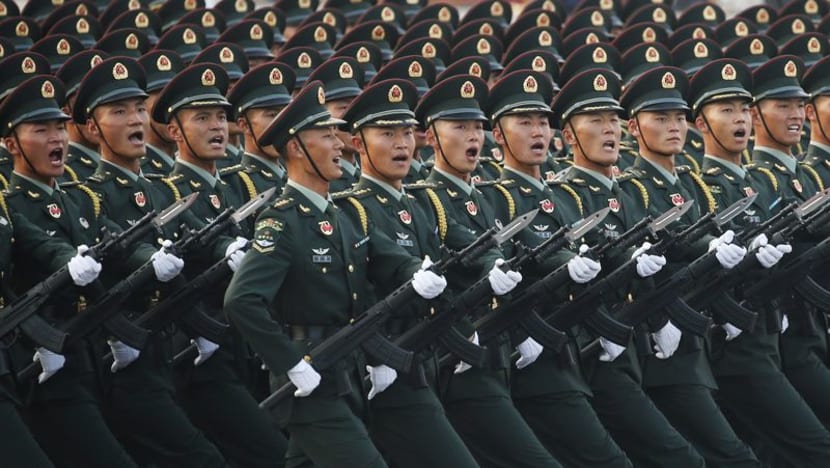China’s military elevates information, space and cyber operations in biggest defence shakeup in 9 years
The restructuring comes amid simmering Sino-US tensions, with cyber warfare emerging as a recent frontier.

Soldiers of People's Liberation Army march in formation past Tiananmen Square during a rehearsal before a military parade marking the 70th founding anniversary of People's Republic of China, on its National Day in Beijing, China, Oct 1, 2019. (File photo: Reuters/Jason Lee)

This audio is generated by an AI tool.
SINGAPORE: China's military is elevating its information, cyber and space operations in a clear indication of its priorities as it undergoes the biggest reorganisation in nearly a decade.
The People’s Liberation Army unveiled a new strategic branch dedicated to information operations last Friday (Apr 19), called the Information Support Force. Defence Ministry spokesman Wu Qian said its establishment is a “major decision” made for the cause of building a strong military.
“It plays an important role and bears great responsibility in promoting high-quality development and the ability to fight and win in modern warfare,” he told reporters in a press conference.
The PLA is also elevating the status of its cyber and space units, making them organisationally parallel to the newly-created Information Support Force.
The announcement marked the first time China has confirmed the existence of the Aerospace Force and the Cyberspace Force, according to China Daily. The local news agency added that the two were widely believed to be major parts of the Strategic Support Force.
The PLA’s Strategic Support Force was founded in December 2015 under the last major military overhaul, focusing on space, cyber and electronic warfare capabilities. It is being dismantled under the latest restructuring.
"VICTORY HINGES ON INFORMATION"
The Information Support Force comes under the direct command of China’s top military body, the Central Military Commission (CMC). According to Nikkei Asia, the cyber and aerospace forces also appear to fall under the direct control of the commission, which is chaired by President Xi Jinping.
Lieutenant General Bi Yi is the commander of the newly created information support force, the state-run Global Times reported. His military career includes serving as deputy commander of the PLA Ground Force, reported Nikkei Asia. The force’s political commissar is General Li Wei.
A commentary by the PLA Daily - the Chinese military’s official newspaper - on Saturday read: “In modern warfare, victory hinges on information. The struggle is between systems, and whoever commands information superiority holds the initiative in war.”
With the latest changes, the PLA now comprises four branches - Ground Force, Navy, Air Force, and Rocket Force - as well as four arms - information, aerospace, cyber and joint logistics support.
“As circumstances and tasks evolve, we will continue to refine the modern military force structure with Chinese characteristics,” said Mr Wu on Friday.
When asked what tasks the cyberspace force will undertake, Wu said cybersecurity remains a global challenge and poses a severe threat to China
“Developing the Cyberspace Force and cybersecurity and defence means are important for reinforcing national cyber border defence, promptly detecting and countering network intrusions and maintaining national cyber sovereignty and information security.”
As for building the aerospace force, Wu said it is of “great significance” to strengthening the capacity to “safely enter, exit and openly use space”.
A government budget report has shown that China will register an annual defence spending growth of 7.2% this year -- in line with last year's rate. In his annual work report to the legislature, Premier Li Qiang called for all-around efforts to press ahead with China's military modernisation campaign. The goal is to do so by 2035. Under President Xi Jinping, China's defence budget has more than doubled since 2013. Low Minmin reports.
CYBER WARFARE IN THE CROSSHAIRS
China’s latest military reforms come amid simmering tensions with the US on issues ranging from the economy to security. Cyber warfare has increasingly emerged as a frontier, with Washington - along with the UK - recently accusing Beijing of carrying out a sweeping cyberespionage campaign.
Last week, FBI Director Christopher Wray said Chinese government-linked hackers have burrowed into US critical infrastructure and are waiting "for just the right moment to deal a devastating blow”, Reuters reported.
According to Mr Wray, an ongoing Chinese hacking campaign known as Volt Typhoon has successfully gained access to numerous American companies in telecommunications, energy, water and other critical sectors, with 23 pipeline operators targeted.
China has repeatedly rubbished Washington’s assertions, while also accusing America itself of carrying out cyberattacks.
A report by the state-run Global Times last Friday said that the “groundless smear” of China conducting cyberattacks is not new. It cited a joint cybersecurity advisory issued in May 2023 by the Five Eyes - an intelligence alliance made up of Australia, Canada, New Zealand, the UK and the US.
The advisory claimed to have discovered a cluster of activity of interest associated with Volt Typhoon, describing it as a "China state-sponsored cyber actor”.
The Global Times referenced a report released on Apr 15 by China’s National Computer Virus Emergency Response Center, saying it shows that Volt Typhoon is a ransomware cybercriminal group that is not sponsored by any state or region.
Chinese Foreign Ministry spokesperson Lin Jian made mention of the report during a daily press briefing on Apr 15.
“Some in the US have been using origin-tracing of cyberattacks as a tool to hit and frame China, claiming the US to be the victim while it’s the other way round, and politicising cybersecurity issues,” he said.
Describing the US as “the world’s largest source of cyberattacks and the biggest threat to cybersecurity”, Mr Lin urged Washington to stop its cyberattacks against China and to stop “smearing” it.













